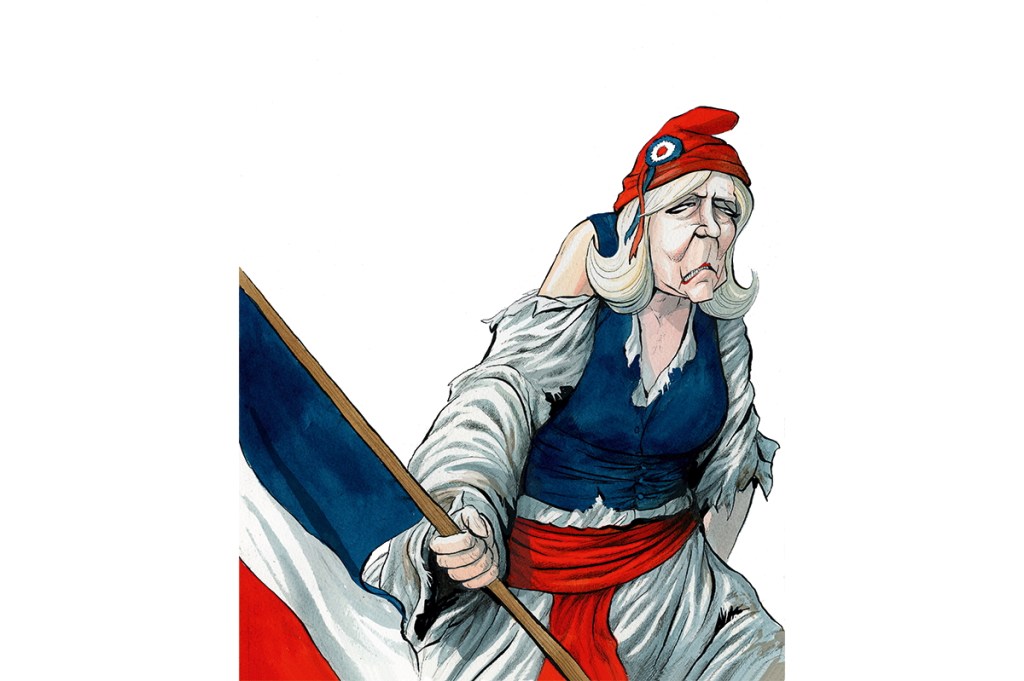It has been a terrible year for the le Pen family. Jean-Marie died in the first week of January. He was the patriarch who in 1972 co-founded the National Front and grew it into a formidable political machine before handing over to his daughter. Marine took command in 2011 and, through a strategy of “de-demonization,” transformed the rebranded Rassemblement National (National Rally) into the biggest single party in the national assembly with 125 seats. She has reached the second round of the last two presidential elections, but it won’t be third time lucky for Marine Le Pen.
Last Monday, a judge disqualified her from politics for five years for misusing EU funds between 2004 and 2016. Le Pen was also given a four-year suspended prison sentence and fined €100,000. Twenty-four other members of her party, including eight members of the European Parliament, were given lesser sentences for what the judge described as well-organized malfeasance. It was accepted that neither she nor her co-accused had personally enriched themselves with €2.9 million from the EU coffers, but in using the money to finance the party the judge said that le Pen had “circumvented democracy.”
Le Pen stormed out of the court before the sentence was passed but had calmed down by the evening when she appeared live on television. Nevertheless, she was in combative mood. It wasn’t just her who had been excluded, she declared, “it’s millions of French people whose votes have been eliminated.” She described the sentence as a “political decision” and a “violation of the State of Law.” Le Pen confirmed that she will appeal the judgment and she also had a message for her 11 million voters: “Don’t worry, I’m not demoralized, I’m outraged.”
Her appeal will be heard next year with a decision made that summer, so time is not on her side, given that the presidential election will be held in April 2027. There is a good chance her appeal will not be successful.
So what are the options for the Rassemblement National assuming Marine Le Pen has been canceled? Many see an obvious successor in Jordan Bardella, the 29-year-old president of Rassemblement, who last year spearheaded the party’s triumphant European election campaign. A poll conducted last week revealed that 60 percent of the party’s supporters prefer Bardella to le Pen. These will likely be younger voters or more bourgeois ones.
Living as I do in Burgundy, a Rassemblement National stronghold, I am acquainted with several people who admire Bardella, and they fall into these two demographics. I also know voters who are loyal to le Pen: they are middle-aged and working-class. A couple of decades ago they voted for the left, but they gravitated towards the le Pens because father and daughter expressed their feelings about the ravages of deindustrialization, the problems of mass immigration and the overreach of the European Union.
While le Pen is routinely described as “far-right,” economically she is statist. In an interview earlier this year she was asked how she would reduce France’s exorbitant civil service wage bill. She brushed off the question, exclaiming: “No, no, that’s right-wing stuff!” Even on questions of identity, she’s hardly a hardliner. In a debate in 2021 with Gérald Darmanin, then the minister of the interior and now the minister of justice, Le Pen was accused of being “soft” on Islamism.
But le Pen will always be the darling of the white working-class because, like them, she carries the scars of an arduous life. She survived a bomb attack on her family home when she was eight; she had a very acrimonious falling out with her father when she expelled him from the party for his anti-Semitism; and she has faced her share of political humiliation, such as when Emmanuel Macron shamed her in a live television debate in 2017. It’s not just Americans who admire a plucky and indomitable underdog; so do the French. Her latest setback will only increase her appeal for her many admirers, even if she is unable to stand.
Marine le Pen may never comprehend that the bourgeois left will hate her to the grave
If Bardella is officially anointed as le Pen’s successor, will he be able to appeal to the le Pen loyalists? It will certainly take some work to win over the older working classes. Ironically, he is genuinely working-class, unlike the bourgeois le Pen, having grown up in the notoriously tough district of Seine-Saint-Denis in northern Paris. Bardella is handsome and courteous, as well as a little bland, which doesn’t necessarily endear him to le Pen’s tribe.
In recent months, some Rassemblement National voters have accused Bardella of moving too far towards the center. This prompted the left-wing newspaper Le Monde to write about the “Macronization” of Bardella. Certainly, Bardella’s response to Donald Trump’s victory last year could have come from the lips of the French president. There was no sense of triumph at the victory of an anti-establishment outsider; rather Bardella expressed his anxiety about what it might mean for Europe in terms of defense, industry, agriculture and energy policy.
Perhaps there was some sense to this. Since Trump took office, both le Pen and Bardella have been strangely subdued. It may have been part of their strategy of “respectability,” of portraying themselves as democrats not demagogues, in the hope the judge would go easy on them. Fat lot of good that did.
Le Pen may never comprehend that the bourgeois left, prevalent among the elite of the media, judiciary, arts and academia, will hate her to the grave. She can “de-demonize” her party as much as she likes, but she will always be a le Pen, the daughter of a man the 1968 generation characterized as the devil incarnate.
But in many ways, her disqualification creates an interesting opportunity for the Rassemblement National, and more broadly the French right. Last year, Bardella published his memoir, Ce que je cherche (What I’m Looking For), in which he wrote: “The idea of uniting working-class French people and part of the conservative bourgeoisie in a single movement – as Nicolas Sarkozy did in 2007 – is a good one.”
This conservative bourgeoisie once voted overwhelmingly for the center-right Republicans, the party of Sarkozy. When Sarkozy was elected president in 2007, the Republicans won 313 of the 577 seats in the subsequent parliamentary elections. Today they are down to thirty-nine. Much like the Tories, the Republicans have moved too far to the center in recent years, while failing to address the concerns of their voters about immigration and economic insecurity.
One consequence of this was the emergence of Éric Zemmour, who launched his Reconquête party in 2021 and polled 2.4 million votes in the 2022 presidential election, 800,000 more than the Republicans.
Le Pen and Zemmour are enemies, a result of her refusal to enter into a coalition with Reconquête in 2022. Bardella is more responsive, and in his autobiography, he said he agreed with much of Zemmour’s diagnosis about what had gone wrong with France. Meanwhile Marion Maréchal, Marine’s niece, served until last year as the vice president of Reconquête. Like Zemmour, Maréchal is more economically liberal and more socially conservative than her aunt.
Le Pen was upset when Maréchal joined Zemmour’s party in 2022, but it was a short-lived switch. Maréchal fell out with Zemmour during last year’s parliamentary elections when she called for an alliance with the Rassemblement National. Maréchal, a member of European Parliament (MEPs), now heads her own party, Identity and Freedom, which consists of her and two other MEPs. She is once more a close ally of the Rassemblement National.
An interesting detail to note, too, is that Maréchal is also close to Giorgia Meloni. Her husband is Italian and a former MEP in Meloni’s Fratelli d’Italia party. Maréchal, Bardella and the French right may now be looking to Italy’s prime minister for inspiration in the post-Le Pen world. In 2022, Meloni triumphed in Italy’s general election as the leader of a right-wing coalition. She and her Deputy Prime Minister, Matteo Salvini, have their ideological differences, but they overcame them, and their reward was power.
If the French right is to triumph, it will need to show similar political maturity, and that includes the Republican Party. One of their senior figures, Laurent Wauquiez, said earlier this year that the only barrier to forming an alliance with the Rassemblement National was they “don’t have the same ideas on the economy.” In other words, the Republicans have no problem with the Rassemblement’s views on mass immigration and law and order.
While it has been a terrible year for the le Pen family, then, it could turn out to be a transformative one for the Rassemblement National, but only if it reaches out to other parties and creates a broader movement. If not, there is the possibility that a left-wing coalition will propel Jean-Luc Mélenchon to power.


























Leave a Reply